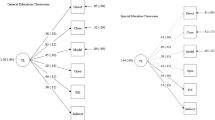Abstract
Sixty-six mothers and their 4-year-old children recorded conversations about the children's experiences during a typical preschool day. Each dyad's ethnic background was either Hispanic or Anglo, with similar numbers of mother—daughter and mother—son pairs represented in each ethnic group. Both low- and middle-income dyads participated. The mother—child conversations were analyzed in order to identify the dyads' tendencies to elaborate on discussions of aspects of the school day related to learning, other individuals, and behavioral conduct as a function of the ethnicity of the dyad and the gender of the child. Gender of child was associated with dyads' propensities to devote differing percentages of their total conversational utterances to the discussion of other individuals and behavioral conduct, and interacted with ethnicity to produce different patterns of discussion related to the topic of learning. Mothers of boys used more elaborative utterances in their discussion of learning-related topics than did mothers of girls. Possible implications of these results for children's subsequent school-related attitudes and performance are discussed.
Similar content being viewed by others
References
Ben Tsvi-Mayer, S., Hertz-Lazarowitz, R., & Safir, M. P. (1989). Teachers' selection of boys and girls as prominent pupils.Sex Roles, 21 231–246.
Bradley, R. H., Caldwell, B. M., & Rocks, S. L. (1988). Home environment and school performance: A ten-year follow-up and examination of three models of environmental action.Child Development, 59 852–867.
Chodorow, N. (1978).The reproduction of mothering: Psychoanalysis and the sociology of gender. Berkeley: University of California Press.
Delamont, S. (1990).Sex roles and the school (2nd ed.). London: Routledge.
Delgado-Gaitan, C. (1994). Socializing young children in Mexican-American families: An intergenerational perspective. In P. M. Greenfield & R. R. Cocking (Eds.),Cross-cultural roots of minority child development. Hillsdale, NJ: Earlbaum.
Diaz-Guerrero, R. (1987). Historical sociocultural premises and ethnic socialization. In J. S. Phinney & M. J. Rotheram (Eds.),Children's ethnic socialization: Pluralism and development. Newbury, CA: Sage Publications.
Dweck, C. S., & Elliot, E. S. (1983). Achievement motivation. In Paul H. Mussen (Series Ed.),Handbook of child psychology (4th ed.). E. Mavis Hetherington (Ed.),Vol. 4:Socialization, personality, and socialization New York: Wiley.
Entwisle, D. R., & Baker, D. P. (1983). Gender and young children's expectations for performance in arithmetic.Developmental Psychology, 19 200–209.
Fivush, R. (1993). Emotional content of parent-child conversations about the past. In C. A. Nelson (Ed.),Memory and affect in development: The Minnesota Symposia on child psychology (Vol. 26). Hillsdale, NJ: Earlbaum.
Fivush, R. (1991). The social construction of personal narratives.Merrill-Palmer Quarterly, 37 59–82.
Fivush, R., & Fromhoff, F. A. (1988). Style and structure in mother-child conversations about the past.Discourse Processes, 11 337–355.
Flannagan, D., & Hardee, S. D. (1994). Talk about preschoolers' interpersonal relations: Patterns related to culture, SES, and gender of child.Merrill-Palmer Quarterly, 40 523–537.
Golinkoff, R. M., & Ames, G. J. (1979). A comparison of fathers' and mothers' speech with their young children.Child Development, 50 28–32.
Graham, L. M., & Flannagan, D. A. (March, 1992).A comparison of low- and middle-income Anglo- and Mexican-American mother-child dyads' conversations about school. Presented at the biennial meeting of the Southwestern Society for Research in Human Development, Tempe, AZ.
Hudson, J. A. (1990). The emergence of autobiographic memory in mother-child conversations. In R. Fivush & J. A. Hudson (Eds.),Knowing and remembering in young children. New York: Cambridge University Press.
Hyde, J. S., Fenema, E., & Lamon, D. J. (1990). Gender differences in mathematics performance: A meta-analysis.Psychological Bulletin, 107 139–155.
Johnson, C. D., & Gromly, J. (1972). Academic cheating: The contribution of sex, personality, and situational variables.Developmental Psychology, 6 320–325.
Kessler, S., Ashenden, D. J., Connell, R. W., & Dowsett, G. W. (1985). Gender relations in secondary schooling.Sociology of Education, 58 34–48.
Mejia, D. (1983). The development of Mexican-American children. In G. J. Powell (Ed.),The psychosocial development of minority group children. New York: Brunner/Mazel.
Miller, P. J., Mintz, J., Hoogstra, L., Fung, H., & Potts, R. (1992). The narrated self: Young children's construction of self in relation to others in conversational stories of personal experience.Merrill-Palmer Quarterly, 38 45–67.
Parsons, J. E., Adler, T. E., & Kaczala, C. M. (1982). Socialization of achievement attitudes and beliefs: Parental influences.Child Development, 53 310–321.
Patterson, C. J., Kupersmidt, J. B., & Vaden, N. A. (1990). Income level, gender, ethnicity, and household composition as predictors of children's school-based competence.Child Development, 61 485–494.
Pettit, G. A., & Mize, J. (1993). Substance and style: Understanding ways in which parents teach children about social relationships. In S. Duck (Ed.),Learning about relationships (Vol. 2). London: Sage Publications.
Phillips, D. A. (1987). Socialization of perceived academic competence among highly competent children.Child Development, 58 1308–1320.
Reese, E., & Fivush, R. (1993). Parental styles of talking about the past.Developmental Psychology, 29 596–606.
Reese, E., Haden, C. A., & Fivush, R. (1993). Mother-child conversations about the past: Relationships of style and memory over time.Cognitive Development, 8 403–430.
U. S. Bureau of the Census. (1990).Statistical abstract of the United States, 1990. Washington, DC.: U.S. Government Printing Office.
Author information
Authors and Affiliations
Additional information
This research was supported by a Faculty Research Grant from the University of Texas at San Antonio and a grant from the Spencer Foundation that were awarded to the first author. We thank Cecilia Cortez, Erik Davison, Melissa Grubbs, Todd Miller, Shawn O'Hora, and Dawn Ramirez for their assistance in data transcription and coding.
Rights and permissions
About this article
Cite this article
Flannagan, D., Baker-Ward, L. & Graham, L. Talk about preschool: Patterns of topic discussion and elaboration related to gender and ethnicity. Sex Roles 32, 1–15 (1995). https://doi.org/10.1007/BF01544754
Issue Date:
DOI: https://doi.org/10.1007/BF01544754




